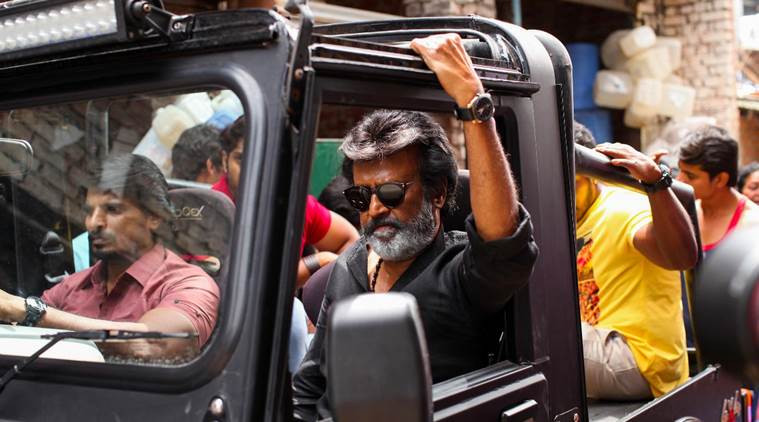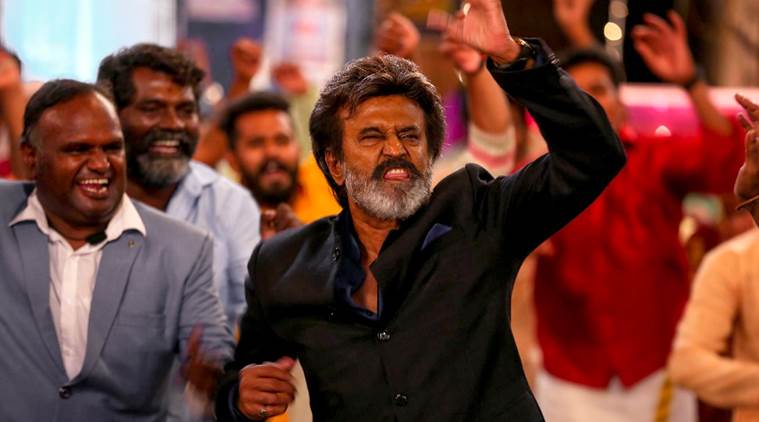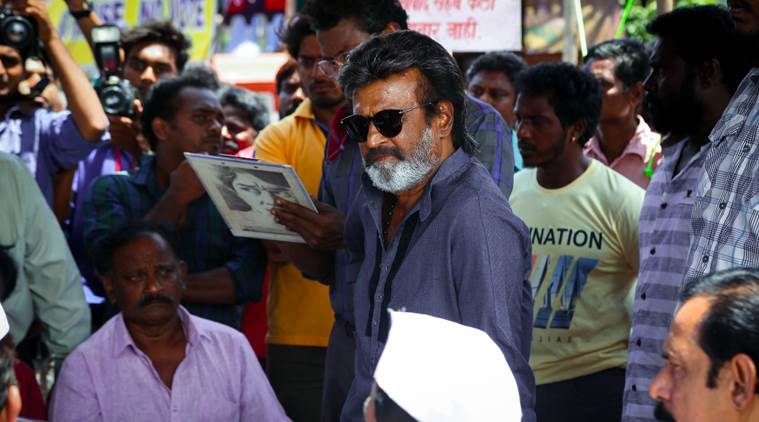 For the second time in a row, after the release of his highly successful Kabali two years ago, Rajinikanth seems to be playing a contemporary Ambedkarite yet again.
For the second time in a row, after the release of his highly successful Kabali two years ago, Rajinikanth seems to be playing a contemporary Ambedkarite yet again.
With barely a year to go for the Parliament elections, and the state-of-play remaining completely muddled, the most eagerly awaited event in Tamil Nadu is Rajinikanth’s enunciation of his political ideology. The superstar has already announced his intent to enter politics and has even suggested that he would pursue a brand of “spiritual politics” but stopped short of saying which way he would swing.
Mindful of his not-so-subtle sympathy for the BJP over the last two decades, many were quick to dub his “spiritual politics” as something contiguous with Hindutva politics. Some even suggested that “spiritual” was a cover-up for Hindutva, and that he may end up as the big-ticket proxy for the BJP that has been looking for a backdoor entry into the state.
But with the release of the latest trailer of his upcoming movie Kaala, in which he is purportedly playing a do-gooder gangster who also doubles as a leader of the oppressed classes in Mumbai’s Dharavi slums, it’s more or less clear that he will not be swinging in favour of the BJP or its brand of politics. For the second time in a row, after the highly successful Kabali two years ago, the man seems to be playing a contemporary Ambedkarite yet again.
In Kabali, in which director Pa Ranjith—a self-admitted Ambedkarite and Tamil nationalist—had astutely packaged the iconic Dalit ideologue’s philosophy and messages in a mainstream commercial idiom, there were no explicit hints of the implicit politics before its release; but in Kaala, you don’t need to be a Roland Barthes to pick up the signs. They are there all over the place — in the posters, the location stills that got leaked, the songs and the trailers.
What made it clearer was the latest trailer released on Monday.
When the first publicity material of Kaala came out a year ago, besides the star, his black costume and the dark surrounding, what caught the attention of people was the “throne” in which he was seated — a Mahindra jeep with the number plate displaying MH01 BR 1956. Having seen the Ambedkarite embodiment of Rajinikanth in Kabali, including the leader’s sartorial philosophy, people were quick to recognise the hidden message: BR denoted BR Ambedkar, and 1956 was the year of his passing.
Equally significant was that 1956 was also the year when Ambedkar converted to Buddhism as a mark of protest against the caste-ridden Hinduism.
 When the first publicity material of Kaala came out a year ago, fans were quick to notice Rajinikanth’s “throne” — a Mahindra jeep with the number plate displaying MH01 BR 1956.
When the first publicity material of Kaala came out a year ago, fans were quick to notice Rajinikanth’s “throne” — a Mahindra jeep with the number plate displaying MH01 BR 1956.
In terms of the movie as a mass media project for emancipation of Dalits or oppressed classes, Kaala looks like Kabali version 2, wherein the territory is shifted from Malaysia to India and the protagonist is taking on a cleanliness-obsessed upcountry leader who seemingly doesn’t like the “dirt that plagues” the slums, and their darkness and poverty.
In the first trailer that was launched two months ago, the upcountry leader played by Nana Patekar, clad in crisp white, says: “I want to make this country clean and pure.” In the second trailer released yesterday, the same leader makes his intent clearer: The “dirt that plagues the slums; the poverty, the darkness — I want to change it all.”
The repartee from Rajinikanth, or Kaala, is straight and simple: “Black is the colour of the proletariat. In my chawl dust scatters into a rainbow.” In the earlier trailer, a voiceover describes what Kaala really is: “Kala means black, the god of death, one who fights to protect”.
 In an earlier trailer, a voiceover describes what Kaala really is: “Kala means black, the god of death, one who fights to protect”. It is also one of the symbols of Dravidian nationalism.
In an earlier trailer, a voiceover describes what Kaala really is: “Kala means black, the god of death, one who fights to protect”. It is also one of the symbols of Dravidian nationalism.
There’s one more politically significant element in Kaala — the celebration of Ravana, god Rama’s villainous antagonist in Ramayana, as a leader of the underclass, just as the way he is eulogised by Dalit/adivasi counterculture movements in various parts of India, particularly in Maharashtra, Madhya Pradesh, Chhattisgarh, Jharkhand and West Bengal.
In fact, to a question from his granddaughter about the identity of Kaala, the white-clad, upcountry politician says “he is Ravan, the demon god” while the title song of the movie extols his virtue as Ravana: “Single headed Ravana; Wear your 10 heads right now.” In the Ravana counterculture, ten heads have great significance.
So, the battle lines are very clear in Kaala: Black Vs White, Dirt Vs Cleanliness and Ravana Vs Rama.
What makes Kaala politically more precise is that it’s happening in India, or more precisely in a terrain where the Tamil regional nationalism can take on the Hindutva nationalism while In Kabali, the setting was Malaysia and the politics was that of emancipation of the oppressed classes as envisaged by Ambedkar. In hindsight, Kabali was the primer and Kaala seems to be the real thing.
And a part of the title songs goes like this:
Win over yourself and these lands
Bring a dream that never ends
Thousand years of silence is enough
Organise, Make Change, Revolt
Educate, Agitate
Rajnikanth couldn’t have lent himself to Pa Ranjith’s grand idea without internalising the big picture, because at the audio launch of the movie last month, he described the back-and-forth processes that both went through for both the movies. In the same speech, he also said that Ranjith was not a person who was looking to do well only for himself, but also for his community. He also said that if Kabali was a director’s movie, Kaala was his too.
So, here’s the big question now about Rajini’s possible political ideology. After playing such an underclass protagonist, or a proletariat leader, that embodies a Tamil nationalistic (black signifies Dravidian nationalism) Ambedkarite being which clearly challenges the north Indian Hindutva politics, can he support the BJP?
Absolutely not.
If he does, his political career will crash-land even before it takes off because in image-based public life, personal is indeed political. Probably, two of his recent political interventions were a giveaway: one, his slamming of the conduct of the BJP and the role of the governor in Karnataka, and the actor throwing his weight behind the agitators against Sterlite Copper in Thoothukkudi.
 The battle lines are very clear in Kaala: Black Vs White, Dirt Vs Cleanliness and Ravana Vs Rama.
The battle lines are very clear in Kaala: Black Vs White, Dirt Vs Cleanliness and Ravana Vs Rama.
Does his observation on Wednesday – that anti-social elements had infiltrated the anti-Sterlite agitation – alter the situation because it seems to support the state government, which is seemingly backed by the BJP-led central government?
Highly unlikely, because a working class mass leader asking his community to use their bodies as weapons to fight against exploitation on celluloid (Kaala) – that’s going to have a sweeping run from June 7 – cannot turn around and practise a political ideology that’s completely the opposite. If Rajinikanth does, he will be a dud in Tamil Nadu politics.